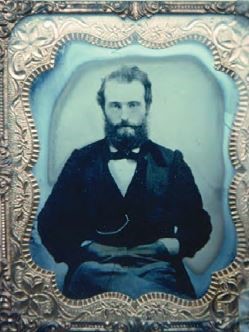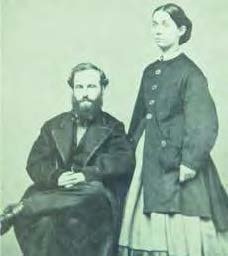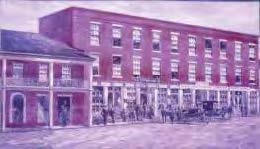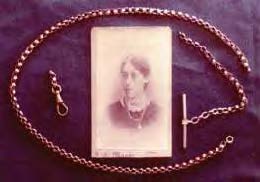By : A.I. Root
An old gentleman once gave me some advice that has been of benefit to me all my life. He was a money lender. I went to him with my father to borrow $500, in order that I might go into business as a partner with the man I was working for. My father was to sign the note with me. When I told why I wanted the money, Mr. Beekman said something as follows:
“My young friend, I have money to let and lending money is my business. With your father for security it will be all right, but I want my money to do good and not harm. I should like to give you a lit le advice, but judging from past experiences with young men I fear it will do no good.”
I urged him to go on.
“Well you have doubtless heard hard stories about me. Perhaps you have heard me called hard names. It is because if I loan money at a reasonable rate I must have it back according to agreement. I should go bankrupt myself if I did not insist on this. If I understand it, you have already had a good job and fair pay.”
I assented.
“Well, even though I have money lying idle and want to have it earning something, I would advise you, at your age, to stick to work and earn the money instead of borrowing. By the time you have earned $500 or something like it, you will know beter how to take care of it and might be able to start in business alone.”
He then turned to my father and remarked that, “Boys in their teens seldom listen to any such advice.”
Right here I surprised both my father and Mr. Beekman by saying:
“Mr. Beekman, I not only thank you from the bot om of my heart, but I am going to take your advice.” As father and I drove home, he said I had lifted quite a lit le from his mind by the course I had taken. In a year or a lit le more, the man with whom I had intended going into business ran away leaving debts right and left unpaid.
When I first commenced business, the inspiring motive was not love for Jesus Christ. It was simply love for a bright young woman about 18 years old who lived off in the country across the river.
That was not a very bad incentive, I admit, but if it had been Jesus Christ it might have included the other love also. Her father feared I would never make a living. Said I (I guess it must have been one moonlight night when we stood by the gate), “We will see.”
So when I opened the jeweler’s repair shop I solicited repairing of all kinds. I fixed doorlocks, umbrellas, parasols, coffee mills, etc. If someone suggested he had better perhaps throw the implement away and buy a new one, I would say, “Oh no, don’t throw it away, I will fi x it and it shall not cost you very much. If I had nothing else to do I would work a couple of hours on an old coffee mill and charge only five cents. I made the charge so low because I did not think the article was enough value to warrant more than a five-cent charge. I was bound to build up business, and I did it, too.
No matter where you are nor how you are situated, if you are lame, blind or deaf or even if you are sick, you can be helpful to those about you and gain the apprenticeship in that great trade of helping others. “Not to be ministered unto, but to minister.” Let that be the moto of your life, and Jesus Christ will see that you are well paid. Yes, “good measure, pressed down, shaken together, running over.” Now, go and look after your wife’s clothes wringer this minute lest this advice simply go in one ear and out of the other without having accomplished anything.
There were two other jewelers in our lit le town of Medina, and the two at the time were almost “one to many.” There was some merriment about my starting a third watch-repairing establishment, but I borrowed a ladder, hung up my sign on a suitable post in front of the window of a vacant store; and before I got down from the ladder I had a job cleaning a watch; and I do not believe I have ever been out of a job since that time. In fact, I tried so hard to keep up with my work I was soon obliged to work evenings as well as all day.
Interfering in a Horse Trade
One Summer day a stranger came in from the West with a covered wagon. He was leading a pretty little pony which he wanted to sell, to enable him to get to his destination. In those days “horse jockeys” were common things, and some of those fellows loafing around the street planned to beat this poor man out of his pony. They offered him a good price but wanted to turn in a gold watch. He brought the watch to me and asked if it was really a good watch. I told him that it was a low carat gold, something that jewelers knew at that time as Philadelphia gold. Then he asked me if it was worth $50.00. I told him $15.00 would be nearer its actual value.
Well, the trade was broken up, and then for the first time in my life I learned that it might be sometimes a lit le dangerous to but in and break up a horse trade. After a while the man who owned the watch marched into the store with a crowd of toughs and gave me a blowing up. He said I was only a backwoods farmer who had never learned the trade and that my whole place was only a one-horse institution anyway. I remonstrated with him and told him the plain truth about his watch, but it only made him the uglier and more abusive. I was so indignant, that I trembled all over and my voice shook so I could hardly talk.
After the crowd had gone and left me alone, a lady came in and I remember how I calmed myself down and tried to talk naturally to my customer. She had a lit le piece of jewelry that in those days was called a microscopic photograph. She said she had had it repaired several times, but they always got the mot o twisted or slanting. She cautioned me to be sure to have the moto stand horizontally as I held it up toward the sky, then she went out saying she would call for it later on. Without any thought of what was coming, I held that lit le piece of jewelry up to my eye and gazed towards the sky through the big glass window. What do you think it was that she called a mot o. This is what I read as if it were painted across the sky:
“But I say unto you, love ye your enemies, do good to them that hate you, bless them that curse you and pray for them that despitefully use you.” I recalled having heard the same words before when I at ended Sunday school as a child, but it had been so many years since that I had forgoten all about it, and then in those days I had not seen the beauty and grandeur of those precious words. Now that I was a man and vexed in spirit I took in their full import. I saw the application at once, and the words were like a drink of cold water to a person stranded in the desert.
The Smooth Stranger
A smooth-tongued chap came into my store one day with a piece of common iron rod, for a cane. On the end of this rod was a coating of silver perhaps as big as a silver dime. He informed me that he had a secret for silver plating that would put silver on iron or any other metal in any desired thickness in a few minutes and that the silver tip on his iron rod had been put on by this process.
I became very much excited and scraped up all the money I could get a hold of, to raise $50.00 to buy the secret. I made a bargain before witness, however, that if, after reading over his recipe, I did not consider it reasonable, he was to let me off or coat the other end of the iron rod in a like manner right before me, and show me how it was done. He was going to put the money in his pocket, but I told him to hold on. When I came to read the secret I found that it was something known to jewelers for years and what was familiarly known as the cyanuret process. My indignation arose at once and I told him before witness that he was a swindler, a liar and a thief. Maybe I was not Christian like but I did not profess to be a Christian at the time. He told me quietly to be careful what I said and was so gentlemanly about it that I began to fear I had made a mistake. Finally I told him I would give him $100 if he would coat the other end of the rod in a like manner by the same process.
He very smilingly told me it would afford him the greatest of pleasure to show me my mistake and to accept my apology, and bowed himself out with such composure that I was in great trouble for fear he would succeed. He said he would go to the hotel and get his apparatus. I watched nervously for his return.
In about half an hour a neighboring jeweler came to my back door with $25.00 in his hand saying he had got it all ready to hand to an agent for a silver plating process, the agent representing that I had just paid him $50.00 for a shop-right for the same thing. My neighbor said he had almost handed the agent the money, for the man seemed so honest and straightforward, but to be perfectly sure he excused himself for a few minutes and went out of his back door, across into my door.
I was in a fighting mood by this time and together we started for my neighbor’s shop. The man stood in the door, but when he saw us both coming at a rapid rate, he put off with such a lively speed that we gave up the pursuit.
The Man Who Wanted to Trade Back
One time an elderly gentleman came into the store to buy a watch. He had never carried a watch and was therefore entirely inexperienced in such maters. After spending an hour or more, I supplied him with one that seemed to suit him. He paid the price asked and went home apparently well pleased.
The next day he came back and the conversation was something as follows:
“Mr. Root, suppose I decide I do not wish to keep the watch just now after all. How much money must I pay you to trade back?”
“Why, the watch runs well, does it not?”
“Oh yes, at least I suppose it does. Yes, it is just with your clock to the minute. There is no trouble with it so far as I know, but I should like to know just how much money I must pay you to take it off my hands.”
It was something of a struggle I confess. I had worked hard, perhaps two hours to make the sale and I did not at all relish taking the watch back and giving him his money. However, as I had sold the watch at a small profit I concluded that the most gentlemanly way would be not to make any change, as it was returned in perfect order, therefore I told him he could have his money back without any charge for my time if he decided he really did not want it. I therefore counted out the exact sum and laid it before him on the counter.
You should have seen his face as he burst into a laugh and put the watch back in his pocket. Then he explained to me the whole circumstance. It seems that he had decided on the purchase without saying a word about it to his grown-up children and when he exhibited it to them and told them he had patronized a town jeweler without having someone experienced in watches to go along with him, they declared he had been swindled outright, and that the watch could not be worth half what he paid for it. He insisted that the man he traded with looked honest, and he said he believed he was honest. Finally one of the sons said:
“Now, look here, father, you go right back to the jeweler tomorrow and ask him how much money you will have to pay him to trade it back. If he does not admit by his reply that he swindled you to the extent of five or 10 dollars we will conclude with you that he is an honest man.”
They worried him so much that he concluded to test his new friend to that extent. The children, of course, had to own up that they were beaten, but they declared that it was a most remarkable thing to find a jeweler who would “swap back” without a bonus. Well, he exhibited that watch with great pride to all his friends and acquaintances, and he told the story enough so that it brought others to my store to buy watches. Dear friends, it was a beter advertisement for me than any notice I ever put in the papers, and yet I did not know it at the time. “Oh ye of lit le faith, wherefore do ye doubt?” A man who is honest and fair and upright not only has the love of God in his heart to cheer him on his pathway through life, not only has the confidence and esteem of his fellow men, but he actually makes more money.
Attitude Toward Business Competitors
Some time later, before my conversion, another jeweler and I had a newspaper controversy, and I occupied column after column in our county paper telling the people how good and smart I was and how bad and how unfortunate my brother jeweler was. Both of us paid for these newspaper notices at so much a line, and threw away our money that way, besides throwing it away in selling things at a price less than we could afford. Does a Christian ever get into such jangles? If he does, it seems to me his Christianity is rather weak.
Customers who wanted to buy articles of some value would go first to one store and then to the other. One rainy day, after my conversion, when trade was dull, someone wanted a piece of plated ware worth 10 or 15 dollars and, in order to get me to lower my price, the woman mentioned the fact that Mr. W. had a beautiful one that he had offered at so much. What ought a Christian to do? I prayed God to show me and the still small voice said, “Do good to those that hate you.” Mr. W. doubtless hated me because I had tried to injure him in the past and had tried to get away his customers and break down his trade in every way I could. I told the customer that it was not unlikely that Mr. W. had got something nicer than I had and perhaps he had succeeded in geting it cheaper than I bought my goods, that I was quite willing she should trade with him for he was a young man just starting in business and I should be glad to see him get along well. The lady looked up in astonishment, but I assured her that I really meant it, and at my advice she bought the goods of my neighbor.
Do you think I felt bad because I had lost the sale? Not at all. God sent into my heart a flood of peace and happiness that was worth more than all the money I ever received in all my life. I kept this up until my neighbor finally concluded that true religion was something worth having, and God crowned it all by enabling me to lead that man to the feet of the Savior.
Did my business suffer meanwhile? Bless you, no! No man’s business suffers because he takes a friendly interest in the business of his rival, and delights in turning trade into his hands. I know that I have not kept up that spirit through all my religious life. If I had I should be a happier man than I am now, and very likely I should be a richer man in dollars and cents.
Although I was in the jewelry business for 18 years, to tell the truth I was never much of a friend to jewelry of any kind. I do not know that I wish to criticize the taste of others, but whenever I received money for jewelry it gave me no such satisfaction as it did when I received it for a beehive.













